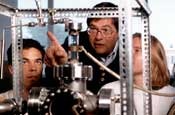Gustavus Adolphus College has recently been awarded $1 million for science education over the next four years from the Howard Hughes Medical Institute (HHMI) in Chevy Chase, Md.
Gustavus is one of 48 undergraduate institutions in the country and one of two institutions in Minnesota to receive a grant award from HHMI this year.
The award will support a variety of programs that seek to transform the first-year student experience in the STEM (Science, Technology, Engineering, and Math) disciplines — particularly through collaboration between the departments of biology and chemistry.
“Gustavus’s proposal to enhance first-year student learning reflects a faculty commitment to transforming the curriculum, a support structure, and culture across STEM departments on campus,” said Provost and Vice President for Academic Affairs Mary E. Morton. “These innovative programs will prepare our students to be leaders in the sciences and in science education. This award also enhances Gustavus’s role as a resource for the region and state of Minnesota through a collaboration with high school science teachers in conjunction with our Nobel Conference.”
Some of the college’s planned initiatives through the HHMI grant include the following:
- Increased participation of first-year students in academic and summer on-campus research.
- Collaborative development of innovative introductory biology and chemistry courses that utilize visualization and imaging to allow students to “see” science.
- Establishment of a Visualization and Imaging Center to help realize curricular innovations at the introductory level, support interdisciplinary research, and ultimately pervade our STEM curriculum.
- Development of a new collaborative outreach program that utilizes the college’s two-day annual Nobel Conference to help high school science teachers from rural south central Minnesota and an inner city Minneapolis high school integrate resources and advanced content preparation related to the conference topic into their teaching.
The largest private funder of science education in the United States, HHMI’s grant program works to enhance science education for students at all levels. It has invested more than $1.2 billion in grants to reinvigorate life science education at both research universities and liberal arts colleges and to engage the nation’s leading scientists in teaching.
“The undergraduate years are vital to attracting and retaining students who will be the future of science,” HHMI President Thomas R. Cech said. “We want students to experience science as the creative, challenging, and rewarding endeavor that it is.”

Leave a Reply
You must be logged in to post a comment.